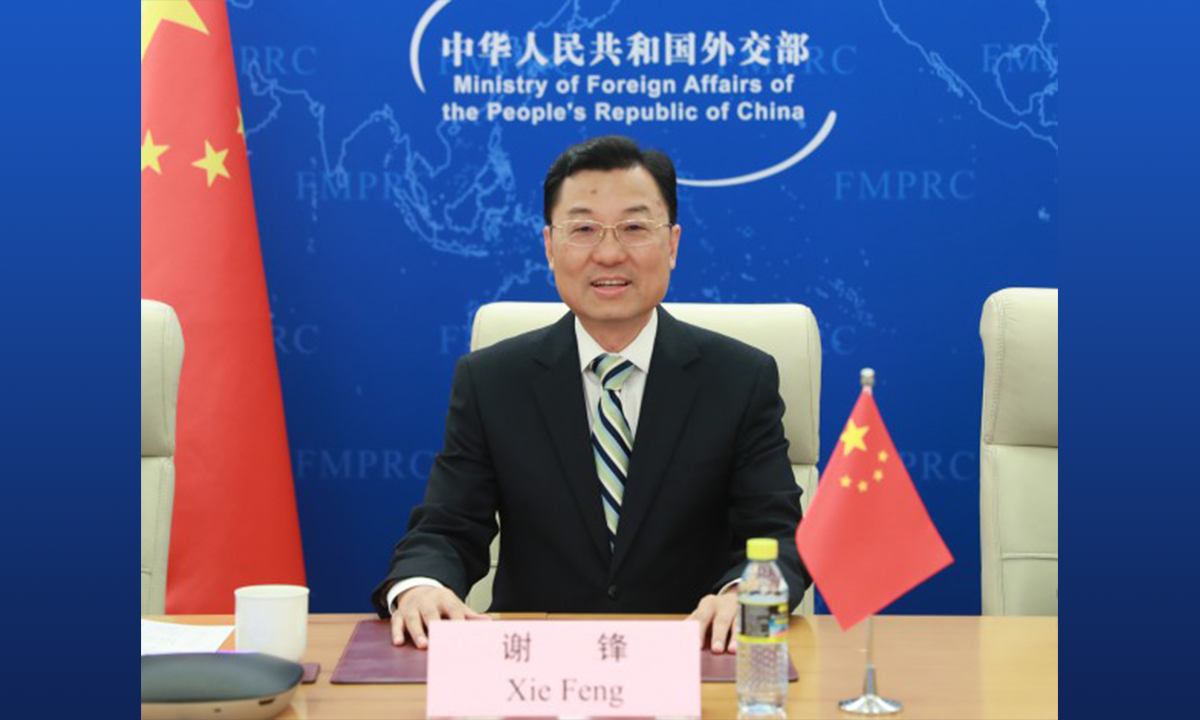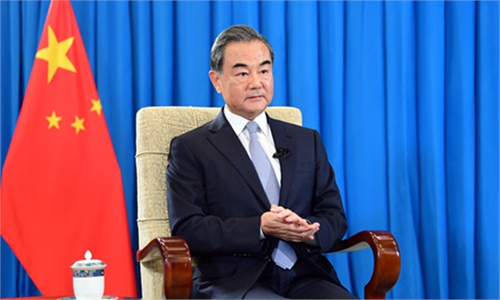Implement UNCLOS in Full and in Good Faith and Actively Contribute to Global Maritime Governance
Keynote Report by Vice Foreign Minister Xie Feng at “UNCLOS at 40: Retrospect and Prospect”

Photo: Courtesy of Ministry of Foreign Affairs
Your Excellency State Councilor and Foreign Minister Wang Yi,
Your Excellency Under-Secretary-General Miguel de Serpa Soares,
Distinguished guests,
It gives me great pleasure to join you in this conference to commemorate the 40th anniversary of the opening for signature of UNCLOS. Just now, State Councilor and Foreign Minister Wang Yi offered important views and proposed pioneering initiatives on upholding the principles and spirit of UNCLOS and advancing global maritime governance. The opinions shared by Under-Secretary-General Soares in his address also give us much food for thought.
The UNCLOS negotiations were the first major international legislative process China took part in after the restoration of its lawful seat at the United Nations. China was one of the first countries that signed UNCLOS in December 1982, and ratified the Convention in 1996, giving a strong boost to its conclusion and entry-into-force. As a State Party to UNCLOS, China has fully and faithfully implemented UNCLOS, and proved itself an active participant, builder and contributor to the Convention and its mechanisms.
First, China has constructed a matrix of maritime legislation to facilitate UNCLOS implementation on the ground. In accordance with the provisions and spirit of UNCLOS, China has promulgated the Law on the Territorial Sea and the Contiguous Zone and the Law on the Exclusive Economic Zone and the Continental Shelf. China has also introduced the Marine Environment Protection Law, the Fisheries Law, the Sea Areas Administration Law and other important maritime laws for the purpose of strengthening the protection of the marine environment and preservation of marine resources. In recent years, by promulgating the Law on the Deep Seafloor Exploration, introducing the Coast Guard Law, and revising the Maritime Traffic Safety Law, China has further strengthened its maritime legislation system consistent with UNCLOS and other international law.
Second, China has ensured standard operation of marine scientific research and worked together with other developing countries to advance human knowledge of the ocean. China has continued to strengthen management of marine scientific research in accordance with UNCLOS, and actively engaged in cooperation on marine scientific research. China has built joint maritime research centers with the Philippines, Indonesia, Vietnam, Pakistan and Tanzania, among others, and assisted Nigeria, Mozambique, Seychelles and Madagascar in conducting scientific research on the continental shelf. Through the participation in the United Nations Decade of Ocean Science for Sustainable Development (2021-2030), China has contributed its share to advance the learning and protection of the ocean.
Third, China has worked to protect humanity's blue homeland and followed a sustainable approach to fisheries development. Under the guidance of Xi Jinping Thought on Ecological Civilization, China has stepped up its participation in the Global Programme of Action for the Protection of the Marine Environment from Land-based Activities of the United Nations Environment Programme to promote clean and beautiful oceans across the globe. China has joined regional fisheries management organizations including in the North Pacific, the Indian Ocean and the Atlantic Ocean, and committed itself to sustainable development of fisheries on the high seas and a zero-tolerance approach to illegal fishing. China is actively studying the accession to the Agreement on Port State Measures to Prevent, Deter and Eliminate Illegal, Unreported and Unregulated Fishing.
Fourth, China has supported the capacity building of the three UNCLOS bodies to facilitate the efficient functioning of the Convention. China has by now acquired five prospecting and exploration mining areas from the International Seabed Authority (ISA) and contributed two reserved areas on its part. Together with the ISA, China has built the world's first joint training and research center on deep seas. China has firmly upheld Annex I Article 5 of the rules of procedure of the Commission on the Limits of the Continental Shelf (CLCS), and submitted to the Commission preliminary information on the limits of the continental shelf beyond 200 nautical miles in the East China Sea. Meanwhile, China has contributed its wisdom and strength to the International Tribunal for the Law of the Sea (ITLOS) with the submission of written statements on relevant advisory opinions. As the largest funding contributor of the ISA and the ITLOS, China has always paid its membership contributions on time and in full, providing strong financial support to the functioning of the two institutional bodies.
China has all along maintained that maritime disputes shall be handled through negotiation and consultation by the parties directly concerned. China does not accept or recognize the so-called "award" of the South China Sea arbitration, which is for the very purpose of upholding the authority and integrity of UNCLOS.
Fifth, China has protected the freedom and safety of navigation and ensured smooth international shipping. China respects and supports the freedoms of navigation and overflight enjoyed by all countries in its surrounding sea areas under international law. China actively implements UNCLOS and the relevant provisions of the International Maritime Organization (IMO), and has acceded to almost all conventions under the IMO framework. China has steadily boosted maritime rescue and other services, and significantly improved the conditions for navigation safety. China has been deeply involved in work related to the Regional Cooperation Agreement on Combating Piracy and Armed Robbery against Ships in Asia, and has actively carried out naval escorts in the Gulf of Aden. Over the years, China has worked proactively to ensure and protect the navigation rights of all countries in different sea areas, and there has never been a problem with navigation in the sea areas within its jurisdiction.
Distinguished guests,
As President Xi Jinping pointed out, the blue planet humans inhabit is not divided into islands by the oceans, but connected by the oceans to form a community with a shared future. At present, global transformation unseen in a century is evolving at an accelerated pace, and new global maritime issues keep emerging. We must accurately interpret and apply UNCLOS in its entirety and in good faith, and give balanced consideration to UNCLOS, other maritime treaties and general international law. We should bear in mind the Convention's original goal of upholding the interests of mankind as a whole, oppose the distortion and abuse of UNCLOS, reject the practice of double standards and selective application, and discard the mindset of "might is right". We should strengthen international cooperation, balance marine environmental protection and utilization, safeguard global food and energy security, attach higher importance to new forms of ocean utilization including seawater desalination and tidal energy, and take credible steps to raise developing countries' ability to learn about, utilize and protect the sea and participate in global maritime governance.
We need to faithfully uphold the purposes and principles of UNCLOS. UNCLOS gives due regard for the sovereignty of all States and aims to promote the peaceful uses of the seas and oceans and realize a just and equitable international economic order. UNCLOS has established important principles including peaceful uses of the seas, freedom of the high seas and the international seabed as the common heritage of mankind. All parties should follow the purposes and principles of UNCLOS, duly exercise their rights under the Convention, fulfill their obligations under the Convention in good faith, reject the law of the jungle at sea, and oppose the attempt to threaten other country's sovereignty and security by using the sea.
We need to strictly abide by the regime on navigation stipulated in UNCLOS. UNCLOS has stipulated the regime on navigation for various sea areas including the territorial sea, exclusive economic zone and high seas. Foreign ships enjoy innocent passage in the territorial sea, but such passage shall not be prejudicial to the peace, good order or security of the coastal State. They enjoy freedom of navigation in the exclusive economic zone, but shall have due regard to the coastal State's sovereign rights over natural resources and jurisdiction over marine scientific research and environmental protection, among others. All parties enjoy freedom of navigation in the high seas, but must comply with such requirements as "the high seas shall be reserved for peaceful purposes". In exercising navigation rights in different sea areas, all parties should fully abide by the provisions of UNCLOS in letter and spirit; otherwise the integrity and authority of UNCLOS will be undermined. Even if one is not a State Party to UNCLOS, it should not underscore only their navigation rights while ignoring the legitimate rights and interests of coastal States. The attempts to misinterpret the regime on sea areas established by UNCLOS and play up the so-called freedom of navigation issues are driven purely by ill intentions. China respects the lawful navigation rights of all countries, but firmly opposes certain country's move to threaten China's sovereignty and security in the name of freedom of navigation.
We need to accurately apply the dispute settlement mechanism of UNCLOS in good faith. UNCLOS advocates "to settle, in a spirit of mutual understanding and cooperation, all issues relating to the law of the sea". The parties to a dispute are the owners of the dispute settlement procedures. Only when the procedures are approved and accepted by the parties concerned, can they be truly effective in settling the dispute. All parties concerned and international institutions should honor the principle of State consent, act in line with the realities of the dispute among regional countries, and accurately apply the dispute settlement procedures in good faith, and must not overstep or abuse their mandate.
Distinguished guests,
Standing at a new historical starting point and faced with new circumstances and challenges, China is ready to work with all parties to uphold the purposes and principles of UNCLOS, fully and accurately implement the provisions of UNCLOS, meet the challenges of the era, steadily improve global maritime governance rules, and build a maritime community with a shared future.
To conclude, I wish this conference a full success. Thank you!

